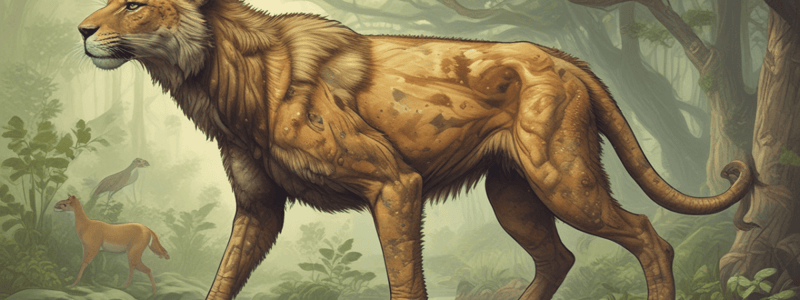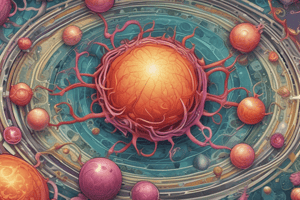Podcast
Questions and Answers
What characteristic do Bilaterians have in common?
What characteristic do Bilaterians have in common?
- Two-way digestive system
- Radial symmetry
- Bilateral symmetry (correct)
- Incomplete digestive tract
Which of the following phyla did not appear during the Cambrian period?
Which of the following phyla did not appear during the Cambrian period?
- Sponges
- Mollusks
- Reptiles (correct)
- Cnidarians
What is believed to be a factor in the Cambrian Explosion?
What is believed to be a factor in the Cambrian Explosion?
- Decrease in atmospheric oxygen levels
- Mass extinction of terrestrial animals
- Evolution of the Hox gene complex (correct)
- Rise of the Ediacaran Biota
What group of organisms are the closest relatives to animals?
What group of organisms are the closest relatives to animals?
What event marked the beginning of the Cenozoic Era?
What event marked the beginning of the Cenozoic Era?
What type of symmetry do Choanoflagellates have?
What type of symmetry do Choanoflagellates have?
What is the primary function of connective tissue in the body?
What is the primary function of connective tissue in the body?
What is the characteristic of epithelial cells that enables them to interface with the environment?
What is the characteristic of epithelial cells that enables them to interface with the environment?
What was the dominant terrestrial vertebrate during the time of the dinosaurs?
What was the dominant terrestrial vertebrate during the time of the dinosaurs?
What is a characteristic of the ancestors of plesiosaurs?
What is a characteristic of the ancestors of plesiosaurs?
What is the composition of the extracellular matrix in connective tissue?
What is the composition of the extracellular matrix in connective tissue?
What is the function of collagenous fibers in connective tissue?
What is the function of collagenous fibers in connective tissue?
What is the term for the two different faces of epithelial cells?
What is the term for the two different faces of epithelial cells?
What is the function of reticular fibers in connective tissue?
What is the function of reticular fibers in connective tissue?
What is the characteristic of connective tissue that allows it to bind to other tissues?
What is the characteristic of connective tissue that allows it to bind to other tissues?
What is the term for the movement of material into and out of cells?
What is the term for the movement of material into and out of cells?
Which of the following groups of organisms is characterized by having a body temperature that varies with its environment?
Which of the following groups of organisms is characterized by having a body temperature that varies with its environment?
Which of the following is an example of a behavioral response to control body temperature?
Which of the following is an example of a behavioral response to control body temperature?
What is the primary mechanism by which homeotherms maintain a relatively constant body temperature?
What is the primary mechanism by which homeotherms maintain a relatively constant body temperature?
Which of the following processes is NOT a way in which organisms exchange heat?
Which of the following processes is NOT a way in which organisms exchange heat?
Which of the following groups of organisms is characterized by having a body temperature that is relatively constant?
Which of the following groups of organisms is characterized by having a body temperature that is relatively constant?
Which of the following is an example of an adaptation that helps animals thermoregulate?
Which of the following is an example of an adaptation that helps animals thermoregulate?
What is the term for the adjustment of metabolic heat production to maintain body temperature?
What is the term for the adjustment of metabolic heat production to maintain body temperature?
Which of the following is a characteristic of ectotherms?
Which of the following is a characteristic of ectotherms?
What is the primary function of mucus in the stomach?
What is the primary function of mucus in the stomach?
What type of transportation occurs in epithelial cells in the digestive system?
What type of transportation occurs in epithelial cells in the digestive system?
What is the primary function of the cecum in the large intestine?
What is the primary function of the cecum in the large intestine?
What is the role of the appendix in the human digestive system?
What is the role of the appendix in the human digestive system?
What is the primary function of the colon in the large intestine?
What is the primary function of the colon in the large intestine?
What is the composition of feces in the large intestine?
What is the composition of feces in the large intestine?
What is the function of the duodenum in the small intestine?
What is the function of the duodenum in the small intestine?
What is the function of the two sphincters between the rectum and anus?
What is the function of the two sphincters between the rectum and anus?
What is the primary factor that affects metabolic rate in both endotherms and ectotherms?
What is the primary factor that affects metabolic rate in both endotherms and ectotherms?
How does the duration of an activity affect an animal's maximum metabolic rate?
How does the duration of an activity affect an animal's maximum metabolic rate?
What is the typical range of energy consumption for most terrestrial animals compared to their BMR or SMR?
What is the typical range of energy consumption for most terrestrial animals compared to their BMR or SMR?
What is the primary difference between BMR and SMR?
What is the primary difference between BMR and SMR?
Which of the following factors does not affect an animal's energy budget devoted to activity?
Which of the following factors does not affect an animal's energy budget devoted to activity?
What is the primary function of the integumentary system in relation to metabolic rate?
What is the primary function of the integumentary system in relation to metabolic rate?
Why do ectotherms have lower metabolic rates than endotherms of comparable size?
Why do ectotherms have lower metabolic rates than endotherms of comparable size?
What is the relationship between metabolic rate and age?
What is the relationship between metabolic rate and age?
Study Notes
Protists and Bilaterians
- Choanoflagellates are protists with morphological and molecular evidence as the closest relatives to animals.
- Bilaterians have bilaterally symmetric form, complete digestive tract, and one-way digestive system.
Cambrian Explosion and the Decline of the Ediacaran Biota
- The Cambrian Explosion refers to the sudden appearance of fossils resembling modern animal phyla in the Cambrian period.
- A few animal phyla appear even earlier: sponges, cnidarians, and mollusks.
- Hypotheses regarding the Cambrian Explosion and the decline of the Ediacaran Biota include:
- New predator-prey relationships
- A rise in atmospheric oxygen levels
- The evolution of the Hox gene complex
Cenozoic Era
- The Cenozoic Era began 65.5 million years ago and continues to the present.
- It followed the mass extinctions of both terrestrial and marine animals, including large, non-flying dinosaurs and marine reptiles.
Physiology
- Physiology is the study of biological functions an organism performs.
- In vertebrates, interstitial fluid allows for the movement of material into and out of cells.
Hierarchical Organization of Body Plans
- Most animals are composed of specialized cells organized into tissues that have different functions.
- Tissues make up organs, which together make up organ systems.
- Connective tissue binds and supports other tissues, containing sparsely packed cells scattered throughout an extracellular matrix.
- Three types of connective tissue fibers are collagenous, reticular, and elastic, all made of protein.
Body Temperature Regulation
- Poikilotherms have varying body temperatures, while homeotherms have relatively constant body temperatures.
- Ectotherms and endotherms have different relationships between heat source and body temperature.
- Behavioral responses, such as huddling or posture, can control body temperature in ectotherms and endotherms.
- Organisms exchange heat by four physical processes: radiation, evaporation, convection, and conduction.
- Thermogenesis is the adjustment of metabolic heat production to maintain body temperature.
Heat Regulation in Mammals
- Five adaptations help animals thermoregulate: an animal's heat loss, measuring energy content of food consumed and energy lost in waste products, activity, and metabolic rate.
- Metabolic rate can be determined by oxygen consumption or carbon dioxide production, and energy content of food consumed and energy lost in waste products.
- Basal Metabolic Rate (BMR) is an endotherm's metabolic rate at rest at a comfortable temperature, while Standard Metabolic Rate (SMR) is an ectotherm's metabolic rate at rest at a specific temperature.
The Integumentary System
- The skin consists of the cutaneous membrane and its accessory organs, comprising three layers of tissue.
- Mucus lubricates and protects the stomach lining from gastric juice.
Digestive System
- The small intestine is the longest compartment of the alimentary canal, where most enzymatic hydrolysis of macromolecules from food occurs.
- The large intestine completes the reabsorption of water that began in the small intestine, and the colon has a role in immunity.
- Feces include undigested material and bacteria, becoming more solid as they move through the colon.
Studying That Suits You
Use AI to generate personalized quizzes and flashcards to suit your learning preferences.
Related Documents
Description
Learn about the characteristics of choanoflagellates and bilaterians, including their morphological and molecular features, and their significance in evolutionary history.



